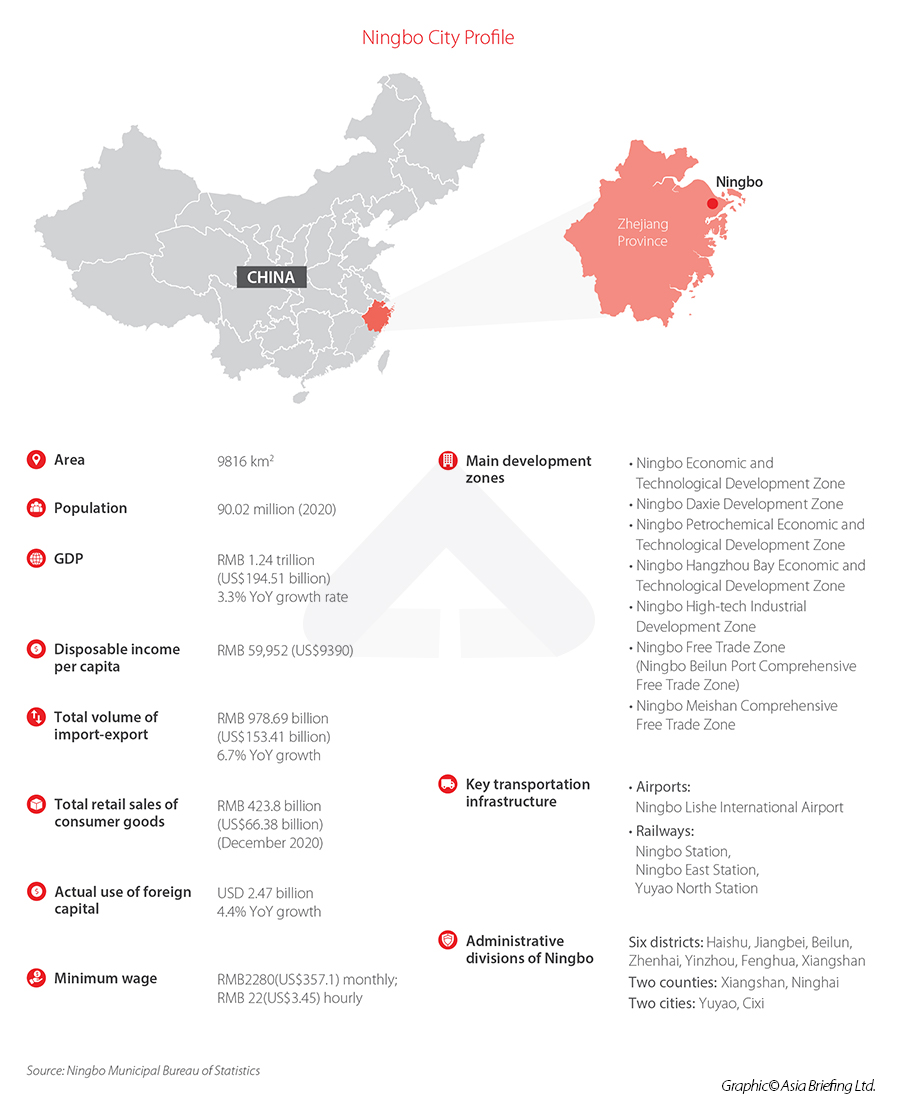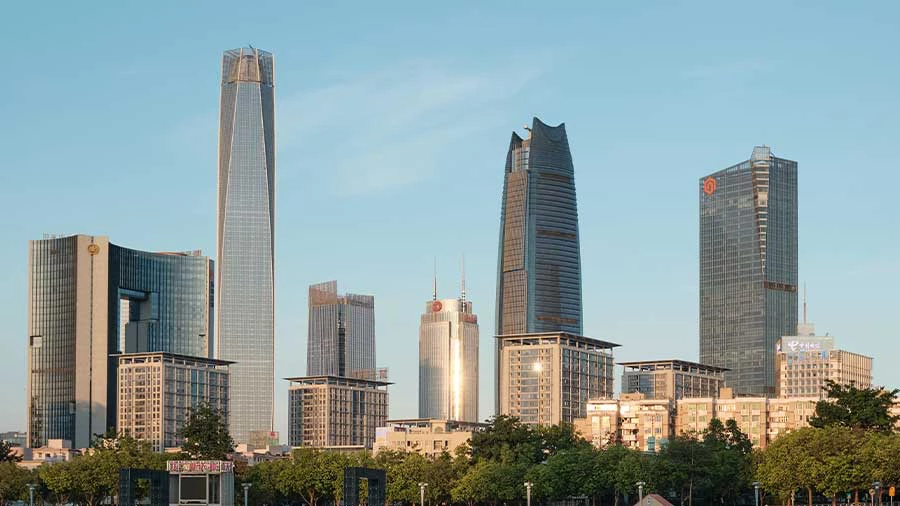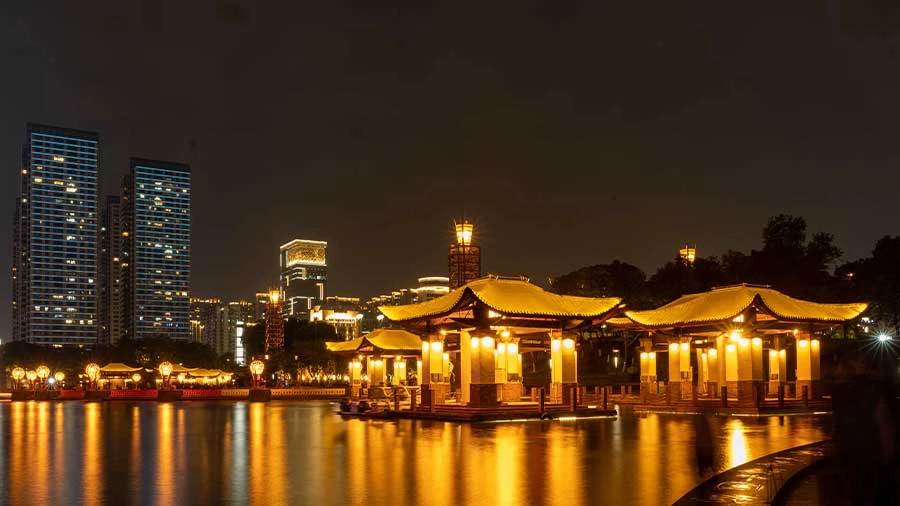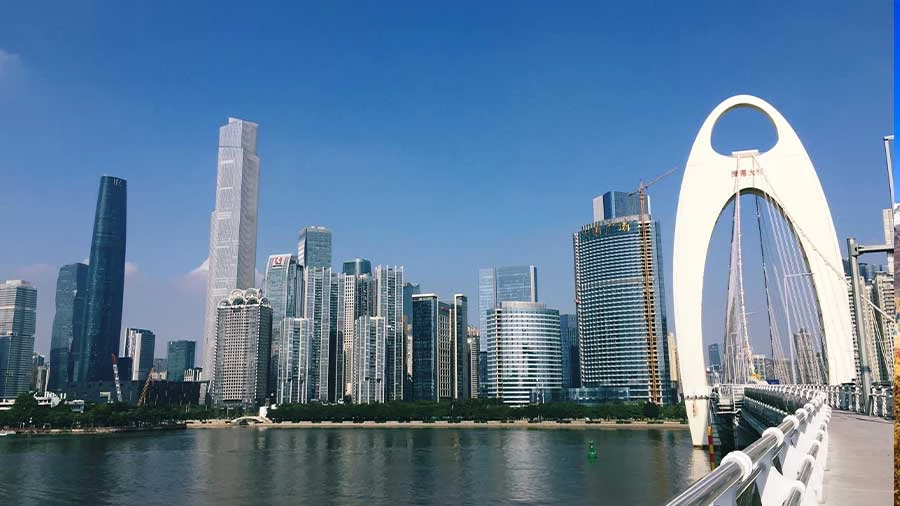Ningbo is a bustling coastal city with a rich history of trade, located in the northeast of Zhejiang province and a key part of the Yangtze River Delta (YRD) region. The city's advanced manufacturing sector, strategic location, and efficient port—all make it a feasible alternative for international companies looking to establish an operation in China. We discuss Ningbo’s trade and industrial landscape and note its city-wide incentive policies for attracting foreign investment.
Why should you consider Ningbo as your investment destination?
Ningbo is a major sub-provincial city in the northeast of Zhejiang Province. As the southern economic center of the Yangtze River Delta, Ningbo has always been a city of historical and economic importance in international trade. With the world’s largest cargo throughput and the world’s third largest container volume, the Port of Ningbo-Zhoushan is a multi-functional, comprehensive, and modern deep-water port integrating inland, estuarine, and seaport.As a city with advanced manufacturing industrial clusters and port-adjacent industrial clusters, Ningbo has profitable enterprises in green petrochemical, automobile manufacturing, and high-end equipment production, among others. The green petrochemical industry facilitates agglomeration of upstream and downstream industries in the large-scale refining-chemical integration base.
Ningbo has ten national development zones, five national demonstration bases of emerging industrial sectors, and many leading enterprises and single champion enterprises showcasing innovation. These initiatives have seen substantial funding allocated to the development of local port infrastructure and transportation systems, contributing to the establishment of a contemporary city equipped with resilient and forward-looking facilities.
In February 2023, the financial media platform Yicai published a list of the leading 20 cities in China for foreign trade, using data provided by the General Administration of Customs. Among these, Ningbo secured the fifth spot with a notable import-export scale of RMB 186.6 billion (approx.US$25.5 billion).
Thanks to the ongoing advancement of Ningbo's industrial enhancements, foreign enterprises have the chance to invest in emerging opportunities resulting from the city's revitalization of its conventional industries, particularly in areas like smart manufacturing. The Bureau of Commerce in Ningbo has emphasized the city's commitment to enhancing the local business environment, expressing its intent to expand economic openness and offer consistent, strong support for foreign investment.
Ningbo’s economic profile
According to the Ningbo Bureau of Statistics, in 2022 Ningbo achieved a regional gross domestic product (GDP) of RMB 1.57 trillion (approx.US$214.59 billion), representing a 3.5 percent increase from 2021. The per capita GDP (calculated based on the resident population), amounted to RMB 163,911 (approx.US$22,403). Out of China’s 300 cities – Ningbo ranked 12th in terms of business climate.Based on the industrial structure in 2022, the added value of the primary industry was RMB 39.2 billion (approx.US$5.35 billion), up 4.1 percent. The secondary industry of the economy was RMB 741.35 billion (approx.US$97.63 billion), up 3.2 percent. The tertiary sector of the economy was RMB 790.88 billion (approx.US$108.09 billion), up 3.8 percent. The contribution of the primary, secondary, and tertiary industries to GDP were 2.9 percent, 42.1 percent, and 55.0 percent, respectively.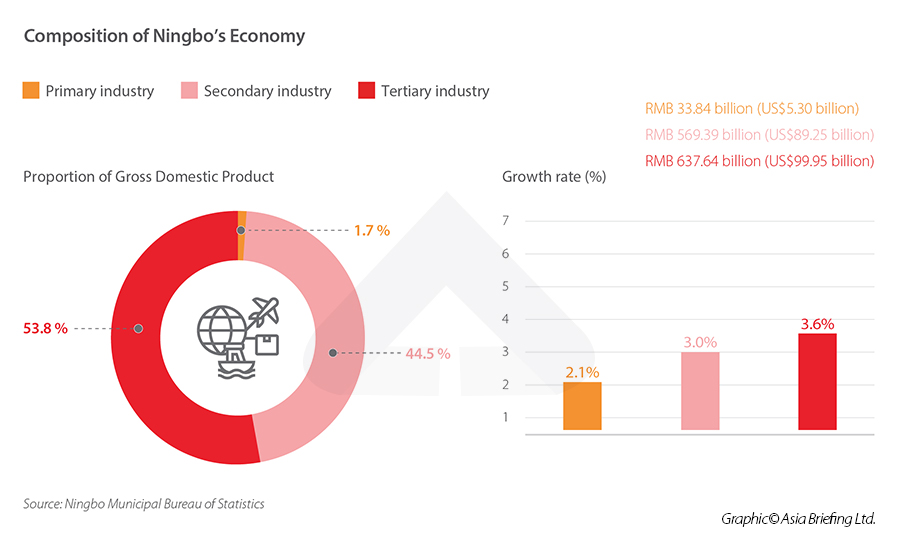
Foreign trade and investment landscape
In 2022, Ningbo maintained its position as the fifth largest exporter in China, consistently holding the sixth spot for foreign trade. The city's total import and export volume reached RMB 1.27 trillion (approx.US$173.57 billion), marking a significant 6.3 percent increase from the previous year, while the gap with the fourth-ranking Dongguan city narrowed to RMB 125.6 billion (approx.US$17.16 billion).Exports amounted to RMB 823.06 billion (approx.US$112.49 billion), up 8.0 percent and imports RMB 444.07 billion (approx.US$60.69 billion), up 3.4 percent. Electromechanical products were the main exported commodities, with an export value of RMB 460.19 billion (US$), accounting for 55.9 percent of the city's total exports.
Import and export volume to the EU, US, and ASEAN reached RMB 229.78 billion (approx.US$31.40 billion), RMB 216.25 billion (approx.US$29.55 billion), and RMB 149.48 billion (approx.US$20.43 billion) in 2022, up 7.8 percent, 3.8 percent, and 19.6 percent, respectively. In particular, between 2013 and 2022, the trade volume between Ningbo and 65 of the countries that adhered to the Belt and Road Initiatives (BRI) surged from RMB 228.28 billion (approx.U$31.21 billion) to RMB 540.68 billion (US$73.89 billion). Notably, over the last decade, the combined import and export volume between Ningbo and other BRI countries hit RMB 3.35 trillion (approx.US$457.86 billion), with an impressive average annual growth rate of 9.5 percent. This growth rate outpaced Ningbo's average foreign trade growth rate by 1.8 percentage points.
Ningbo attracted 410 foreign-invested projects worth US$5.75 billion by the end of 2022. The city’s actual use of foreign investment stood at US$3.73 billion, up 13.8 percent. Of this total, 356 new projects were approved by the tertiary sector, representing an increase of 17.1 percent in the actual utilization of foreign capital of US$2.62 billion.
High-level transition in industrial sectors
Ningbo has a strong advanced manufacturing industrial cluster. In 2022, the added value of the manufacturing industry in the city reached nearly RMB 668.117 billion (approx.US$91.31 billion), a year-on-year increase of 3.3 percent.Out of the 35 main industrial categories, 15 industries exhibited a positive increase in value-added, notably with the chemical raw materials, computer communication, and automobile manufacturing sectors experiencing growth rates of 24.8 percent, 15.1 percent, and 14.5 percent, respectively.
Automotive
The automotive industry serves as the bedrock of Ningbo's thriving manufacturing sector. Over the past year, the region's automotive sector has demonstrated a consistent trajectory of growth, with a clear strategic focus on establishing a robust new energy automobile hub at the trillion yuan level.Amidst the ongoing transformation in the Ningbo automotive sector, a remarkable shift has redefined traditional manufacturing frameworks, propelling the industry towards cutting-edge technological innovations. Notably, the thriving success story of ZEEKR, a Ningbo-based "unicorn," serves as a testament to the progressive spirit animating the region's automotive landscape. Indeed, the company has been at the forefront of developing intelligent electric vehicles, cementing its position as an icon of innovation and forward-thinking in the industry. In 2022, ZEEKR achieved a significant milestone by surpassing 80,000 cumulative units delivered and secured a substantial Series A financing round of US$750 million, leading to a post-investment valuation of US$13 billion.
At the same time, other industry players such as Xu Sheng, Topu, Junsheng, and Jifeng, operating within the automotive component sector, have also strategically propelled themselves up the value chain through a global expansion strategy, catering to the discerning demands of the high-end market.
Advanced manufacturing
The city is home to more than 120,000 manufacturing enterprises, operating in fields such as textile, garments, home electric appliances, plastic machines, auto parts, stationery, and mold. Since most enterprises engage in traditional manufacturing, their upgrade involves the industrial internet industry, for example, through automation. This will help local manufacturing entities improve efficiency, move operations up the industrial value chain, and expand the region’s overall production capacity.The city's progress in this domain is evident, with the Ministry of Industry and Information Technology (MIIT) recognizing nine 5G-powered factories as national models as of March 2023. Notably, Ningbo has successfully executed digital transformations in over 10,000 projects, with 81 projects earning recognition as municipal demonstration scenarios for the application of 5G and industrial internet technologies.
Modern services
Since the 13th Five-Year Plan, Ningbo has prioritized the development of the services sector as an essential way to speed up economic transformation. The city’s 14th Five-Year Plan further consolidated this goal, proposing that the city will become a national software hub and domestic leader in the industrial internet by 2025, aiming at an overall revenue generated by the software and information services topping RMB 300 billion (approx.US$41 billion ).In 2019, the services sector surpassed the local manufacturing sector for the first time, accounting for 49.1 percent of GDP. By 2020, the city’s service industries’ added value was projected to account for 53.8 percent of the city’s GDP.
The services sector is now a driver of local economic growth and the main source of Ningbo’s tax revenue. Ningbo’s (tertiary) services sector structure has been optimized, and breakthroughs have been made in finance, commerce, science and technology, and information services industries; the proportion of producer services in the tertiary sector has risen to about 60 percent.
Indeed, the government of Ningbo has been actively striving to propel the city's tertiary sector into a realm of unprecedented growth and development. With a strategic focus on key industries, the administration is determined to transform Ningbo into an international trade and oil and gas resource allocation hub, aiming to elevate the overall value of commodity sales to RMB 5 trillion (approx.US$683.46 billion). As part of this effort, significant emphasis has been placed on nurturing the logistics industry.
Furthermore, the government has dedicated efforts toward establishing Ningbo as a prominent regional financial center within the southern Yangtze River Delta, envisioning a robust financial asset base of 6 trillion yuan. To stimulate cultural and creative businesses, a comprehensive plan is in place to elevate their revenue to RMB 500 billion (approx.US$68.34 billion) by 2025.
Additionally, the government has directed its attention to various tertiary sectors such as catering, health, senior care, real estate leasing, and property services, seeking to bolster their annual revenues to at least RMB 50 billion (approx.US$6.83 billion) each. A comprehensive strategy is also in place to ensure a robust sports industry, with plans to have 3.2 sports instructors for every 10,000 people, thereby establishing Ningbo as a model city for the sports sector.
High-tech industries
Ningbo has demonstrated a remarkable surge in its high-tech industries, with the added value reaching RMB 77.09 billion (approx.US$11.86 billion) in the first quarter of 2022, the highest among all cities in the province of Zhejiang as a whole. Notably, this figure reflects a yearly increase of 1.7 percent and contributes to 58.4 percent of the total achieved by industrial enterprises above the designated size in the city during the same period. Investments of 16.37 billion yuan injected into Ningbo's high-tech sectors marked an 11.8 percent year-on-year increase.Ningbo's high-tech products have found application in prestigious events such as the Beijing Winter Olympic Games and the Shenzhou XIII spaceship. Notably, the city has successfully pioneered the nation's first liquid helium-free magnetic resonance imaging (MRI) system, underlining its commitment to cutting-edge innovation.
Recently, the city government unveiled an action plan aimed at further enhancing the business environment for high-tech enterprises. Details can be found in the table below.
|
Ningbo's Action Plan for the Development of High-Tech Enterprises |
|
| Policy | Measures |
| Action Plan for Creating a Better Environment to Support the Development of High-Tech Enterprises (2022-2025)
《关于营造更好环境支持高新技术企业发展的行动方案(2022-2025年)》
Available here |
The plan introduced by the Ningbo Municipal Bureau of Science and Technology encompasses 20 specific measures, including:
|
Where to set up in Ningbo
Economic and Technological Development Zone
Founded in 1984, with a total area of 29.6 square kilometers, Economic and Technological Development Zones in Ningbo are among China's earliest and largest national development zones.Relying on the advantages of ports and their development linkages, the Economic and Technological Development Zones of Ningbo (Beilun District) has formed a port-adjacent industrial cluster with the automobile, equipment, petrochemical, steel, and energy as its focus. After more than 35 years of development, integrated circuits, high-end equipment, new materials, etc. are other emerging industries.
The Economic and Technological Development Zone host a large number of frontier enterprises, such as Geely, Shenzhou, and Haitian. There are 784 industrial enterprises located here, out of which 11 enterprises have an output value exceeding RMB 10 billion (approx.US$1.57 billion), 58 enterprises have an output value exceeding RMB 1 billion (approx.US$0.16 billion), and 18 companies are listed at home and abroad.
Ningbo Daxie Development Zone
Established in 1993, Ningbo Daxie Development Zone benefits from the state-level economic and technological development zone policy. Through 27 years of development and construction, Daxie has come to focus on port development, green petrochemical, and new chemical materials industries. As a modern port area, the Daxie Development Zone ranks among China’s top 10 comprehensive port areas.The world’s largest 450,000-ton crude oil terminal is here, accounting for 21 percent of the total number of berths in Ningbo. The zone is thus well poised to develop the green petrochemicals industry. It aims to become an international energy trade center and a leader of energy reform in China.
Ningbo Bonded Zone (Ningbo Beilun port comprehensive bonded zone)
Established in 1992, Ningbo Bonded Zone is the earliest bonded area in Zhejiang province. On April 27, 2020, the State Council approved the transformation and upgrading of the original area of Ningbo Export Processing Zone to Ningbo Beilun Port Comprehensive Bonded Zone, which was then included in the scope of Zhejiang Free Trade Zone (Ningbo Area). At present, the zone accounts for nearly 10,000 enterprises of various types; in 2020, the region’s total production value was RMB 20.18 billion (approx.US$3.16 billion), an increase of 6.6 percent.The area focuses on four functional industries – international trade, processing and manufacturing, bonded logistics, and digital. In the area of international trade, it has gathered more than 3,500 international trading enterprises. There are platforms for cross-border import e-commerce bases, imported goods markets, imported goods direct sales centers, and Central and Eastern European Specialty Products Perennial Exhibitions. In bonded logistics and digital, the zone has gathered more than 330 warehousing logistics enterprises.
China-Italy (Ningbo) Ecological Park
The China-Italy (Ningbo) Ecological Park, established in 2014 as a national-level international cooperation ecological park in Zhejiang province, has emerged as a significant player in the region's industrial landscape. With its five industrial bases and a science and technology city focusing on new energy vehicles, new materials, health, general aviation, energy conservation, and environmental protection, it has become a hub for innovation and sustainable development. Notable enterprises such as Zhejiang Geely Holding Group, Jing-Jin Electric (Beijing) Co Ltd, and Martinrea (Shanghai) Co Ltd have chosen the park as their base, underscoring its appeal to both domestic and international investors.Collaborating with Tus-Holdings Co Ltd has further propelled its focus on research and development. Boasting a remarkable 75.2 percent yearly increase in industrial output, which amounted to RMB 13.96 billion yuan (approx.US$2.02 billion) in 2018, the park is now poised for even more significant expansion.
With plans to introduce 80 additional enterprises and elevate its industrial output to 50 billion yuan by the end of 2023, it remains committed to fostering sustainable growth and global economic integration.
Yongjian Software Industrial (Metaverse) Park
The Yongjiang Software Industrial Park, designed to become a national innovation hub for the metaverse industry, has secured approval from authorities and began construction in June 2023. With a substantial investment of RMB 1.91 billion (approx.US$276.81 million), the 85.8-mu (5.72 hectares) facility aims to accommodate 20 metaverse-related companies and achieve an impressive annual output value surpassing 10 billion yuan within five years.Ningbo's burgeoning software industry has already showcased promising growth, with a remarkable 19.5 percent year-on-year revenue increase in 2022, surpassing the average growth rate of sub-provincial cities in the nation by 9.5 percentage points, as per official data.
City-wide policies and incentives
To encourage overseas investors to invest locally, Ningbo City implements various incentive policies for foreign investment projects that meet certain industry requirements, along with city-wide projects to open up the city even more to foreign investment.Some recently implemented policies are illustrated in the table below:
|
Ningbo City-Wide Incentive Policies |
|
| Policy | Measures |
| Ningbo Port and Shipping Development 14th Five-Year Plan
《宁波市港航发展“十四五”规划》 Available here |
Measures include:
|
| Implementation Opinions of the General Office of the People's Government of Ningbo Municipality on Continuously Promoting the Construction of "Quality-Oriented Ningbo
《宁波市人民政府办公厅关于持续推进“质优宁波”建设的实施意见》 Available here |
The Opinions set forth by the Ningbo municipal government mark the beginning of the new three-year action plan for "Quality-Oriented Ningbo,” which aims to establish Ningbo as an internationally competitive quality hub by 2025.
The initiative focuses on six major areas:
|
| Ningbo's Action Plan for Building an International Open Hub City (2022-2026)
《宁波市人民政府办公厅关于印发宁波打造国际开放枢纽之都行动纲要(2022—2026年)的通知》 Available here |
Key objectives are:
|
| Ten Measures of Ningbo City to Benefit Enterprises in Science and Technology
《关于印发“宁波市科技惠企政策十条“的通知》 Available here |
Measures include:
|
Conclusion
Ningbo's thriving economy and supportive environment for innovation have garnered attention globally, attracting significant foreign investment. With its strategic development zones and favorable business initiatives, Ningbo is rapidly emerging as a hub for various industries, including manufacturing, technology, and petrochemicals, as recognized by reputable sources like Forbes.As the city continues to foster an environment conducive to international business, Ningbo's trajectory points toward a future where it could host some of the world's most innovative companies. Bolstered by its crucial position in global logistics and transportation networks, exemplified by the significance of the Ningbo port, the city is on the brink of an exciting tomorrow, drawing the interest of foreign businesses seeking to be part of its promising growth story.
This article was originally published on November 23, 2021, and last updated on October 26, 2023.



